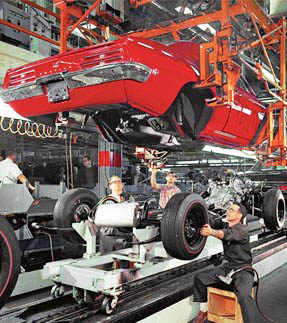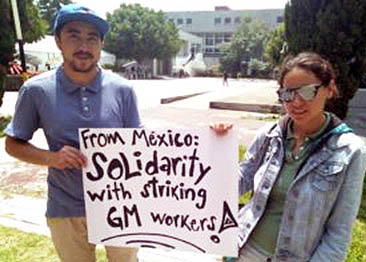|
|
|
|
The weekly newsletter of the México Solidarity Project |
|
|
|
March 23, 2022/ This week's issue/ Meizhu Lui, for the editorial team |
|
|
A 1992 Chevy Camaro |
|
Driving Camaros Across the Border — and Wages Down |
|
In 1964, Ford birthed the first Mustang, a midsized two-door with a V-8 engine that could accelerate like a race car. For any red-blooded American guy, what not to like! General Motors, naturally, would soon come out with its own “muscle car,” the Chevy Camaro. In our interview this week, we talk with a veteran labor activist, Mark Masaoka, who remembers those days. Mark helped build Camaros at GM’s plant in Van Nuys, California.
Auto execs back then didn’t actually see themselves in the business of thrilling the buying public with vehicles that maxed out on sex appeal and mechanical magic. They saw their prime responsibility — and still do — as getting shareholders the highest possible returns.
In Auto America’s earliest days, with cars competing to replace the horse and buggy, Henry Ford believed those highest possible returns would only come if his company made cars workers could afford. Said Ford famously: “I want my workers to be able to buy my cars.”
But that perspective would fade as highways took transportation’s center stage. Cars became a necessity as automaker political muscle privileged roads over rail. Car companies, by the 1990s, could care less whether their workers could afford the cars they were making. And with new global trade agreements letting corporations and capital — but not workers — whiz across borders with ease, GM would soon race its jobs making Camaros right out of the US to find cheaper labor.
Today, three decades later, a massive GM plant sits in the central México city of Silao, a place where workers can’t afford decent sanitation, much less a car. But those workers just weeks ago elected a vibrant new independent union, SINTTIA, to start bargaining a new contract with GM. With rising international solidarity between autoworkers, these workers now have a real shot at taking the driver’s seat — in their own future.
The fledging SINTTIA, not yet collecting dues, has no money to buy the vehicle they need to travel outside Silao to organize other Mexican auto plants. Please donate today to help them get — not a Camaro — but a pick-up truck! |
|
|
|
Don’t miss an issue. Subscribe to the weekly México Solidarity Bulletin! |
|
|
|
|
Working for GM: Past, Present, and Future |
|
Mark Masaoka served as a UAW local union officer at the GM Van Nuys plant in California, where he worked as an electrician until the plant closed in 1992. Always interested in expanding worker power, he’s now helping Rideshare Drivers United, an independent union of Uber and Lyft drivers. A long-time Asian American movement advocate, Masaoka has remained active in the Asian American community and also works with the Democratic Socialists of America.
How did you land at the GM plant in Van Nuys, and what turned you into a union militant? |
|
|
I knew nothing about unions growing up. Then I met Philip Vera Cruz, the person who inspired me to join working class struggles. Vera Cruz, a farmworker and Marxist, had organized his fellow Filipino workers into the National Farm Labor Union. In 1965, his Delano, California local became the first to strike against the grape growers. Vera Cruz and Cesar Chavez would join forces to form the United Farm Workers Union after the growers tried to use Mexican workers to break the strike. The civil rights movement also radicalized me and other young Asian Americans. I wanted to organize with workers of color. |
|
I worked first for Ford. As a part-time worker, I made $13 an hour — in 1976! The majority of auto workers there owned their own homes. But that plant closed down in 1980, and I got hired at Van Nuys.
Latinos made up the largest share of workers at Van Nuys, and we had roughly equal numbers of black and white workers. So people from all communities benefited from working at GM. Our contract allowed retirement after 30 years, so you could conceivably retire comfortably at 50. |
|
|
An ad visual for the Pontiac Firebird produced at GM Van Nuys |
|
Next to housing, the high cost of health insurance probably worried workers the most, and at Van Nuys we negotiated full health benefits for both workers and retirees.
When did GM decide to close Van Nuys?
GM announced it would close Van Nuys in 1983. With Japanese cars hitting the US market, US car companies had cut production as demand for US cars dropped. Another reason for the shutdown: the benefits UAW workers had won. The health benefit turned out to be particularly costly. Other countries have national health insurance, so the notion of moving to Canada looked good to GM: Canadian workers would not make health benefits a contract issue. And México looked attractive too, with its wages kept at rock-bottom levels by union strongmen willing to take payoffs to sell out the workers.
But we weren’t going to give up good jobs easily. We formed a huge labor-community coalition, and we threatened a boycott of GM cars. We won such positive media coverage that even conservative legislators joined the fight to keep Van Nuys open. That mobilization would keep the plant going for another nine years.
But Van Nuys finally closed in 1992. For workers, a disaster. From $18 an hour, laid-off workers had to take jobs paying maybe $8, because Southern California’s major manufacturing plants had all closed. And, of course, the once-thriving community around the plant also took a nose-dive.
NAFTA was signed the same year that Van Nuys closed, and our Chevy Camaro production got relocated to Canada. My last task at the plant was packing up production equipment getting sent to a maquiladora in México. Did that equipment go to the new GM plant in Silao? That plant opened in 1996, so that’s very possible.
With companies moving abroad, workers often blame foreign workers for the loss of their jobs. That was horrifically demonstrated with the beating death of Vincent Chin.
In 1982, a couple of UAW workers killed Vincent Chin, a Chinese American man. They thought he was Japanese, and they blamed the Japanese for taking US jobs. They took out their misplaced rage on a random Asian man. My local sent a delegation to Detroit to stand with Chin’s mother, who was demanding justice for her son.
It's absolutely critical for union leadership to be clear about who is and who isn’t to blame for job loss. Unfortunately, the “Buy American” campaigns that the UAW has waged promote a false nationalism. These campaigns don’t educate the membership on how employers play workers of different nationalities off against each other. They don’t help workers understand the importance of unity across borders. |
|
Do you think the recent SINTTIA victory at GM Silao is going to affect US workers?
Wage inequality is so wide — US autoworkers make 10 times more than Mexicans — that even if SINTTIA wins a huge raise, that’s not going to be enough to make GM change where it builds cars. That said, the better the contracts of Mexican workers, the less incentive US companies will have to move production to México. |
|
|
In 2019, Mexican GM workers and students sent messages of |
|
Where there will be a big change is going to come at the social level. Ousting sham unions in México will change the relationships of solidarity between US and Mexican workers. With sham unions out of the way, union workers will have the possibility of coming together across national boundaries to coordinate strategies that challenge corporate power. We can end the race to the bottom — and rise together! |
|
|
Colonial Arrogance — and Anti-Colonial Dignity |
|
The European Parliament, an institution currently sending millions of euros in arms to prolong a war instead of pursuing diplomacy, is now tut-tut’ing the Mexican government over human rights — and revealing a certain colonial arrogance in the process. Anointing themselves with an authority that does not belong to them, the EU Parliament’s members earlier this month overwhelmingly approved a motion condemning the situation of journalists and human rights defenders in Mexico. |
|
|
The EU lawmakers specifically called out Mexican President Andrés Manuel López Obrador for his “extremely hostile attitude” toward journalists and made an effort to tie the recent rash of killings to the president’s rhetoric.
Anyone who might doubt the neocolonialism underpinning the resolution need only take a look at the declarations made during the EU Parliament’s debate on it. The arguments of the resolution’s supporters dripped with arrogance and an interventionist attitude suggesting that Europe knows best. The first MP to speak in favor of the condemnation motion? No surprise: the Spanish ultra-rightist Leopoldo López Gil, the father of Venezuelan coup monger Leopoldo López.
The EU resolution struck a nerve inside the Mexican government, and López Obrador personally crafted the government’s response. His communiqué, mincing no words, charged that EU deputies had joined “like sheep” with “the corrupt group that opposes the Fourth Transformation” and its struggle “to confront the monstrous inequality and violence” brought upon México by 36 years of neoliberal rule.
“México has ceased to be a land of conquest,” the statement continued, and has become instead a nation endeavoring to realize the core “principles of equality and democracy.”
The Mexican government response, predictably enough, caused an uproar. The Guardian’s Tom Phillips couldn’t contain himself. He called the statement “peculiar and cantankerous” and tried to tie López Obrador to both Donald Trump and Jair Bolsonaro. Domestically, Mexican opposition leaders leaped on the controversy, proving yet again that they see not upsetting the colonizers as much more important than standing up to insults against the Mexican people and their duly elected government.
As a journalist and a human rights defender, I do worry about the state of impunity that enemies of press freedom and human rights in our country have long enjoyed. Our government clearly must do more to protect journalists and human rights defenders. But as an anti-imperialist I cannot tolerate interventionist statements by the EU. Economic considerations drive these statements, not genuine concern for human rights. The EU resolution does nothing to actually improve the situation in México.
Europe’s political class may have lost the independence wars. But they seem to continue to see themselves as the ultimate arbiters of justice in their former colonies. Franz Fanon, in the Wretched of the Earth, had the most appropriate response to that arrogance. He urged us years ago “not to imitate Europe” but to instead “combine our muscles and our brains in a new direction.” We needed, he noted, to “try to create” the new humanity that “Europe has been incapable of bringing to triumphant birth.” |
|
José Luis Granados Ceja, a Mexican freelance journalist, is currently studying human rights and popular democracy at the Autonomous |
|
|
|
Recent news reports and commentaries, from progressive and mainstream media,
Kurt Hackbarth, In México, AMLO’s Opponents Are Resorting to Smear Campaigns, Jacobin. In an effort to damage his reputation, sections of the Mexican media are coming after Andrés Manuel López Obrador with baseless charges and concocted slander.
Susan Ferriss and Joe Yerardi, As guest workers increase, so do concerns about wage cheating, Center for Public Integrity. Since 2005, the US Labor Department has ordered employers to pay back wages to 69,000 workers on visas performing seasonal low-wage jobs. But labor advocates say employers have shortchanged many more seasonal workers.
Legislation gives domestic workers access to health insurance and other benefits, México News Daily. The Senate has approved a reform that would ensure that México’s more than 2 million domestic workers have access to social security benefits.
Carlos Enrique Tapia, El delirio de los medios de comunicación corporativos, Polemón. Vivimos un momento estelar para la libertad de expresión, pero el derecho a la información es violentado a diario por los medios corporativos, los que no dudan en publicar falsedades que buscan convertir en verdades.
Same-sex marriage is now a reality in Yucatan, Yucatan Times. Miguel Luciano Martínez and Irving Suárez Pérez have just become the first same-sex couple to be legally united since the recent approval of Yucatan’s new state family code.
David Brooks, Armeros de EU: nuestra ley nos protege de las acusaciones de México, La Jornada. Los fabricantes de armas demandados por México en un tribunal federal en Massachusetts argumentaron que las leyes estadunidenses los protegen de las acusaciones.
Andrea Navarro and Maya Averbuch, AMLO’s New Airport Opens With Hoopla, Criticism, 8 Flights a Day, Bloomberg News. Felipe Angeles International Airport, a military base converted into a commercial airport, sits north of downtown México City, the first of López Obrador’s major infrastructure projects to be completed.
Maurizio Guerrero, “Queremos Vivir”: The Workers Who Wouldn’t Die for the Pentagon, In These Times. A rebellion in the maquiladoras is helping people imagine how to organize and face future challenges. |
|
|
The Mexico Solidarity Project brings together activists from various socialist and left organizations and individuals committed to worker and global justice who see the 2018 election of Andrés Manuel López Obrador as president of México as a watershed moment. AMLO and his progressive Morena party aim to end generations of corruption, impoverishment, and subservience to US interests. Our Project supports not just Morena, but all Mexicans struggling for basic rights, and opposes US efforts to undermine organizing and México’s national sovereignty.
Editorial committee: Meizhu Lui, Bruce Hobson, Bill Gallegos, Sam Pizzigati, Courtney Childs, Victoria Hamlin, Agatha Hinman. To give feedback or get involved, email us! |
|
|
|
Web page and application support for the México Solidarity Project from NOVA Web Development, a democratically run, worker-owned and operated cooperative focused on developing free software tools for progressive organizations. |










